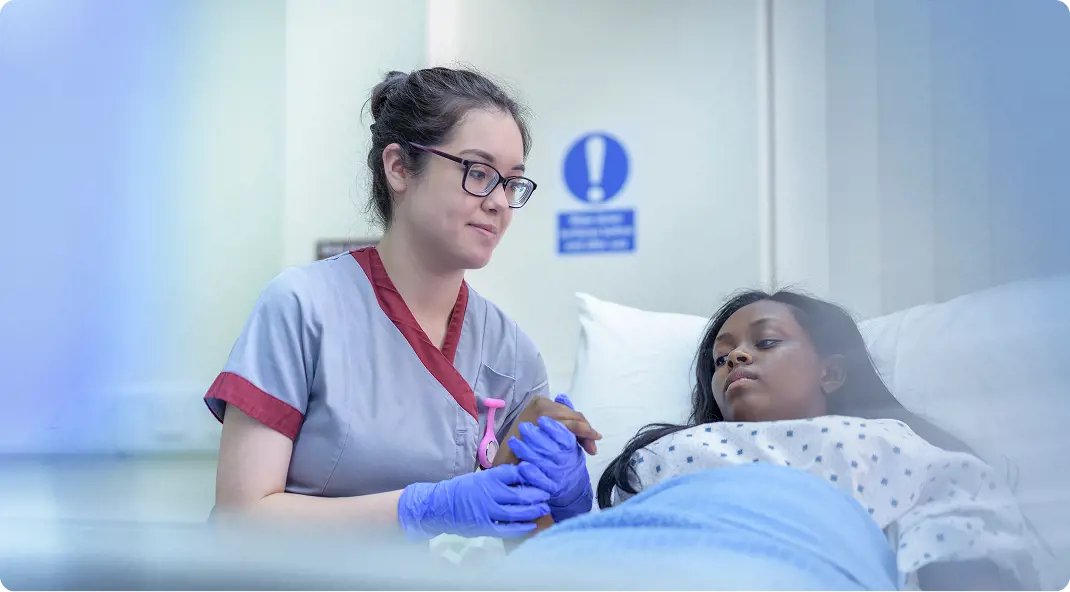What is a GNM Course? A Detailed Explanation
The General Nursing and Midwifery (GNM) program is a crucial foundation for aspiring nurses, providing a thorough education and hands-on experience essential for success in the nursing profession.
This blog will explain the GNM Nursing course details, including its goals, eligibility requirements, advantages, and potential career paths, offering a comprehensive overview of this essential healthcare education program.
What is a General Nursing and Midwifery (GNM) Degree?
A General Nursing and Midwifery (GNM) degree is a diploma course designed to prepare students to work as nurses in various healthcare settings, unlike a B.Sc. Nursing program, which is a degree course, GNM is a diploma-level course that typically spans three and a half years, including a six-month internship. The curriculum offers various different subjects, such as anatomy, physiology, microbiology, psychology, and nursing fundamentals, along with midwifery and gynecological nursing.
The GNM course is structured to provide a balance of theoretical knowledge and practical training. Students engage in classroom learning, laboratory work, and hands-on clinical practice. This comprehensive approach ensures that graduates are well-versed in medical and nursing theory and adept at applying their knowledge in real-world healthcare scenarios.
What are the Eligibility Criteria for GNM?
To enroll in a GNM course, candidates must meet specific eligibility criteria:
Educational Qualifications
Applicants must have finished their 10+2 education with a minimum score of 40-50% marks, preferably with science subjects (Physics, Chemistry, and Biology). Some institutions also accept candidates from other streams, provided they meet the minimum percentage requirement.
Age Limit
Candidates must be between 17 and 35 years old at the time of admission. This age range ensures that students are mature enough to handle the rigors of nursing training and young enough to have a long career ahead.
Health Requirements
A medical fitness certificate is usually required to ensure the candidate is physically fit to undertake the course. This is crucial as nursing can be physically demanding, requiring stamina and good health.
Entrance Exams
Some institutions may conduct entrance exams or interviews to select eligible candidates. These assessments are designed to gauge the applicants' aptitude for nursing and their foundational knowledge in relevant subjects.
What is the Objective of the GNM Course?
The primary objective of the GNM course is to equip students with the knowledge and skills necessary to provide high-quality nursing care. The course aims to:
Provide Competent Nurses
Train students to become competent nurses capable of working in various healthcare sector, including hospitals, clinics, and community health centers. This includes teaching them to manage patient care, administer medications, and use medical equipment proficiently.
Promote Health and Well-being
Educate students on promoting health, preventing illness, and caring for the sick and injured. This involves learning about disease prevention, health education, and wellness promotion.
Enhance Clinical Skills: Provide hands-on training and practical experience to enhance clinical skills in patient care. Students participate in clinical rotations in different departments, such as surgery, pediatrics, and obstetrics, to gain diverse clinical exposure.
Professionalism
This includes teaching students about patient confidentiality, ethical decision-making, and the importance of compassionate care.
Benefits of the GNM Course
Choosing a GNM nursing course comes with numerous benefits that make it an excellent option for aspiring nurses:
Cost-Effective Education
Compared to B.SC nursing course fees in Punjab, the GNM course is generally more affordable, making it accessible to a broader range of students. This affordability extends to both tuition fees and related expenses, such as books and supplies.
Shorter Duration
The GNM course duration is shorter, allowing students to enter the workforce sooner. This is particularly advantageous for those who need to start earning quickly due to financial constraints.
Practical Experience
The curriculum is designed to provide extensive practical training to make sure graduates are well-prepared for real-world nursing challenges. Clinical rotations and internships allow students to apply their learning in real healthcare settings under the supervision of experienced professionals.
High Demand for Nurses
There is an increased demand for qualified nurses globally, offering a lot of job opportunities for GNM graduates. The elderly or aged population, increasing prevalence of chronic diseases, and expanding healthcare services contribute to this demand.
Pathway to Advanced Studies
GNM graduates can pursue further studies, such as a B.Sc. Nursing courses to enhance their qualifications and career prospects. Many institutions offer bridge programs that allow GNM diploma holders to transition smoothly into degree programs.
Career Prospects of the GNM Course
GNM graduates have number of career opportunities in various healthcare settings. Some of the potential career paths include:
Staff Nurse
Staff nurses work in hospitals, clinics, nursing homes, and other healthcare facilities, providing direct patient care. They are integral to patient care teams, assisting doctors, monitoring patient progress, and managing medical records.
Community Health Nurse
Focus on public health by working in community health centers, conducting health camps, and educating the public on health issues. These nurses are crucial in preventive healthcare, vaccination drives, and health education campaigns.
Home Care Nurse
Home care nurses provide nursing services to patients in their homes, offering personalized and continuous care. They support patients with chronic illnesses, post-surgical recovery, and elderly care, enabling them to live independently.
Midwife
Specialize in maternal and child healthcare, assisting with childbirth, and providing prenatal and postnatal care. Midwives support expectant mothers through pregnancy, labor, and the postpartum period, ensuring the health and well-being of both mother and baby.
Nursing Educator
Nursing educators teach and train future nurses in nursing schools and colleges. They develop curricula, conduct lectures, and mentor students which contributes to the advancement of the nursing profession.
Advanced Studies
Pursue higher education, such as a B.Sc. Nursing degrees can open doors to more advanced and specialized roles in nursing. Higher qualifications can lead to positions in nursing administration, research, and specialty nursing fields.
Conclusion
The General Nursing and Midwifery (GNM) course is a practical and cost-effective way to start a career in nursing quickly. It focuses on giving students real experience and is great for those ready to dive into healthcare. After finishing the GNM course, there are a lot of job choices available, like working in hospitals or community health, and it also opens up opportunities for more study. For example, one can go on to get a B.SC in Nursing to learn more and have even more job opportunities. This course is a good fit for anyone who loves nursing and wants to work in healthcare, helping to fill the need for qualified nurses everywhere.
If you want to have a career in Nursing, get your GNM degree from a well-known place like Phoenix Nursing Institutes. Their courses are flexible, they've been teaching nursing for a long time, and they have great teachers. Plus, Pheonix Nursing Institutes offers many scholarships to its students. It’s a great choice if you’re serious about a nursing career.



